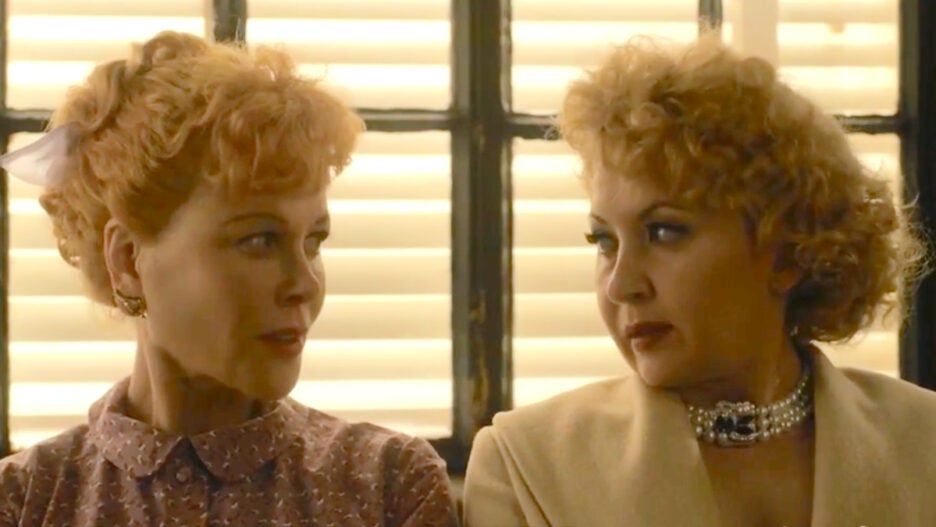Everything that happens in “Being the Ricardos” really did happen. But it didn’t happen in the same week, or anything close to it, and Sorkin, by presenting it as if it did (not that he’s trying to fool anyone; he’s acknowledged the made-up timeline in interviews), has actually created a quintessential expression of the Sorkinese aesthetic. The dialogue in “Being the Ricardos” has the blunt directness, dagger wit, and perfectly cut corners of Sorkinese — a sound that might be described as hardass Talmudic screwball. Beyond that, though, the entire movie is a piece of thrillingly stylized compression. It gets a real head of steam going, a hurtling energy and anxiety that rides on everything Lucy is feeling. And what Lucy does is to take her own pent-up anxiety — over the Communist-accusation situation, but mostly over the possibility that Desi is an adulterer — and pour it into that week’s episode of “I Love Lucy.” She keeps taking over the set, directing more than the director does, tweaking the comedy bits, trying to make it all work better, trying to make it more…authentic. We see her vision as a comic artist (and her attempt to seize the terrain of male power). But what she’s also doing, on some level, is trying to make the Ricardos be what she wants her and Desi to be. She keeps asking: What would Lucy do? What would Lucy not do? What she’s really asking is: What should Lucy do?
“Being the Ricardos” is a comedy of marriage, deft and romantic yet spun around a deadly serious suspicion that keeps eating away at Lucy. It’s also the R-rated version of a workplace-as-family sitcom, with characters who thrust and parry but also curse and speak their minds with toxic glee. It’s a backroom drama of corporate showbiz politics, showing us how the sausage of television gets made (or did in the ’50s). It’s a Lucille Ball biopic, showing us the movie star she nearly was before she got kicked off the star track and wound up creating the persona of Lucy Ricardo. And it’s an homage to “I Love Lucy” and everything that made it a hilarious culture-shifting touchstone, and also a deconstruction of “I Love Lucy.” Not everything in “Being the Ricardos” happened in one week, but part of what the film captures about the live-wire fishbowl of ’50s television is that it feels like it could have.
The movie is structured around the creation of that week’s episode, and from the moment everyone sits down at the first table reading, Sorkin sets a tone of high-spirited malice, in which these TV veterans are too mouthy and successful not to say just what they think. J.K. Simmons has a field day as William Frawley, the vaudeville veteran who played the curmudgeonly Fred Mertz, who Simmons makes 10 times as much of a curmudgeon off-camera — he’s a rancorous coot who likes to nip whiskey at dive bars at 10:00 a.m., and whose favorite pastime is to come up with new ways to insult his costar, Vivian Vance (Nina Arianda). But Simmons is such a sly dog that, of course, he keeps unpeeling the character. Beneath the bilious loner is a nostalgic relic of Old Hollywood, a caustically witty observer and, on some level, a real human being.
Nina Arianda, as Vivian, is just as indelible. She shows us how the feisty Vivian longed to break out of the fuddy-duddiness of her role as Ethel, a character married to her grandfather (as she puts it), and she brilliantly reveals how it cuts Vivian to the quick when she learns her new diet is being monitored by everyone on the show, from Lucy on down — because she’s not supposed to stray too far from the ideal of American “normalcy.”
Yet it’s the dance of Kidman and Bardem that gives “Being the Ricardos” its light but molten magic. I went into the movie not being able to put Nicole Kidman and Lucille Ball together in my head. But here’s how good Kidman is. As the Lucy of the sitcom, she’s perfection, nailing the squalls and pop-eyed double takes, the blaring voice, the whole way that Lucy Ricardo was goofy-clueless with an invisible trickiness — a form of passive-aggression. The sitcom moments, in black-and-white, are presented almost like dreams. But off-camera, Kidman captures the brassy glamourpuss that Lucille Ball was. She makes Lucy sensual and demanding, prickly and affectionate, with an ability to read the room — a quintessential modern woman who was stuck in the role of always trying to drag the rest of the world to catch up with her.
The movie tells Lucy’s story in flashbacks, going back to her days as an RKO contract player, where she met Desi on the set of “Too Many Girls.” And we see the moment when the possibility of stardom flickered for her. “The Big Street” (1942), in which she costarred with Henry Fonda, becomes a hit with critics and performs respectably at the box office, and when she gets a meeting with the head of production at RKO, Charles Koerner (Brian Howe), it’s a classic scene that speaks dark volumes about Hollywood — then and now. Kidman’s tag line is one of the three most exquisite readings of Sorkinese I’ve ever heard. (Read more.)
Share




















No comments:
Post a Comment